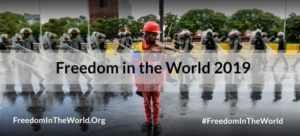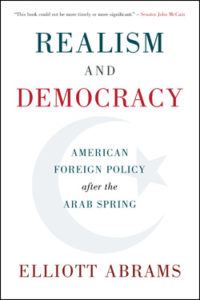 Democracy is in retreat, facing an “ominous decline” across the world, according to the latest “Freedom in the World” report from Freedom House.
Democracy is in retreat, facing an “ominous decline” across the world, according to the latest “Freedom in the World” report from Freedom House.
It is a global retreat and it is unlikely to be reversed unless and until the United States once again makes democracy promotion a true priority in its engagement abroad, argues Ivo Daalder, the president of the Chicago Council on Global Affairs and a former U.S. ambassador to NATO.
The decline of democracy is a deeply worrying trend. But it’s not a new one, as the late political scientist Samuel Huntington [author of The Third Wave] once explained, he writes for the Chicago Tribune:
Over more than a century, democracy and freedom have ebbed and flowed — strongly advancing at times, then retreating for a while, before advancing once more…. America stood at the center of each successive wave of democracy — as an exemplar in the 19th century and its active promoter since the end of World War II. If freedom is to thrive — if a fourth wave of democracy is ever to take hold — it will once again fall to America to take the lead in its promotion abroad.
The current democratic regression is unlikely to be reversed unless and until the United States once again makes democracy promotion a priority in its engagement abroad, Daalder contends.
Democracy assistance can facilitate democratic transitions, not as a form of externally-driven regime change or political engineering, but by empowering indigenous actors to pursue locally-based agendas.
For example, Venezuela’s citizens are leading their struggle for democracy, said the USAID acting administrator for Latin America and the Caribbean. But USAID has a long tradition of standing by those who have continued to assert their rights and maintain a democratic voice in the face of dictatorship, USAID’s Steve Olive told the US House of Representatives Foreign Affairs Committee this week.
“USAID supports local human rights defenders, civil society, independent media, electoral oversight, and the democratically elected National Assembly in Venezuela,” he added. “Over the past five years, we have provided close to $40 million in democracy assistance to these groups, including the planned $15 million in Fiscal Year 2018 funding.”
 Similarly, Elliott Abrams, the new administration envoy for Venezuela.is working with U.S. allies to restore democracy in Venezuela, notes analyst Max Boot. By opposing international intervention, his critics show a fundamental confusion, he writes for the Washington Post:
Similarly, Elliott Abrams, the new administration envoy for Venezuela.is working with U.S. allies to restore democracy in Venezuela, notes analyst Max Boot. By opposing international intervention, his critics show a fundamental confusion, he writes for the Washington Post:
Going back to his days in the 1970s as an aide to Democratic senators Henry “Scoop” Jackson and Daniel Patrick Moynihan, he has been one of the foremost advocates of democracy promotion in U.S. foreign policy. In 1981, he wrote a seminal memorandum for the Reagan administration which said that “Human rights is at the core of our foreign policy, because it is central to America’s conception of itself.” Abrams became one of the foremost advocates of abandoning pro-American dictators when democratic alternatives were available. RTWT
The International Republican Institute – a core partner of the National Endowment for Democracy – has highlighted the damage that Maduro and his government have done to the electoral integrity and democracy in the country, notes Travis Green, IRI Senior Program Associate for Latin America. What we see today is simply the logical effects of a dictator further dismantling the few structures that remain, which are necessary for governing effectively, while isolating citizens through fear and repression, he adds, offering a summary of Venezuela’s challenges, starting in October 2017…







